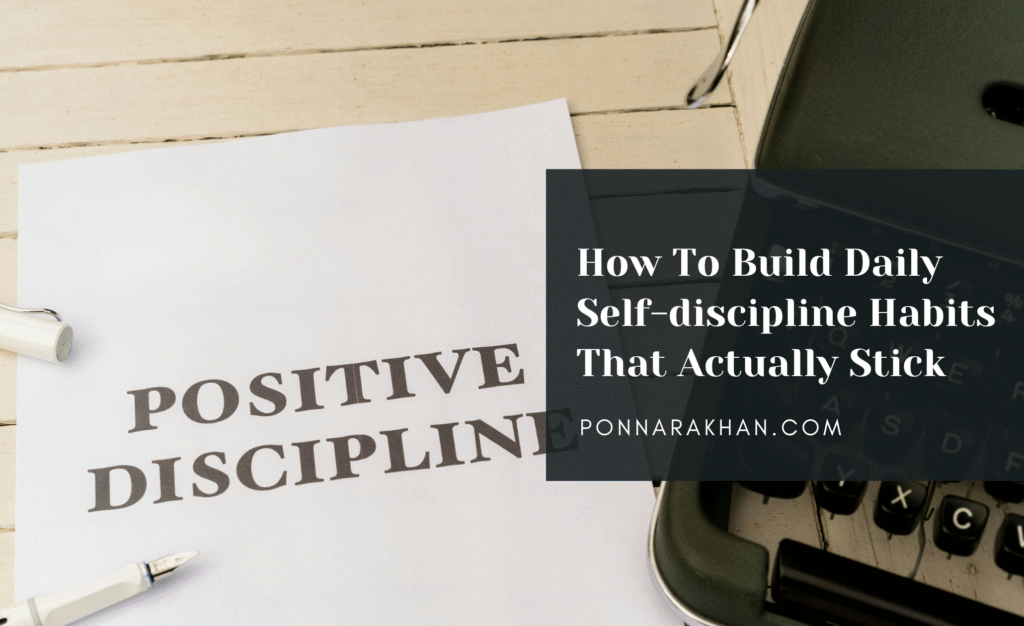Have you ever started a new routine, only to give up after just three days?
Self-discipline is a lot like self-control, but with one key difference: it’s about setting your own rules and sticking to them. It’s the ability to manage your thoughts, emotions, and actions so you can stay focused on what truly matters—even when it’s uncomfortable, inconvenient, or not instantly rewarding.
Whether it’s improving your productivity, staying healthy, or growing as a person, self-discipline is essential for long-term success.
In this article, you’ll learn how to build daily self discipline habits with 10 practical tips you can apply right away to create a happier, more focused, and more fulfilling life.
1. Why Most People Fail to Build Self Discipline
Self-discipline is essential for achieving success—but only a small number of people actually manage to build it. Why is it so difficult? Let’s explore some of the main reasons.
One major reason is the lack of clarity. Without clear goals, it’s hard to stay motivated or even know what you’re working toward. If you don’t have a specific outcome in mind, building consistent self-discipline becomes incredibly challenging. Vague intentions lead to weak willpower because there’s no strong “why” driving your actions.
Another common obstacle is trying to build too many habits at once. When you overload yourself with multiple new routines, it drains your energy and quickly kills motivation. We all have limited time each day to manage work, family, and personal life—so it’s important to focus on just a few manageable habits instead of overwhelming yourself.
Lack of accountability and tracking is also a key factor. When life gets busy or we’re too tired, it’s easy to forget about the habits we’re trying to build. But having a system to track your progress—like a habit tracker or journal—can keep you on course and give you a daily sense of achievement, which helps reinforce your discipline.
Lastly, many people rely on willpower alone, which isn’t sustainable. Our environment is full of distractions, and motivation naturally comes and goes. That’s why self-discipline needs support—through structured routines, tracking systems, and even small rewards to keep you moving forward.
2. 10 Practical Tips to Build Daily Self Discipline Habits
Let’s dive into how to effectively build daily self-discipline habits that truly stick. By following these practical tips, you’ll find it much easier to develop strong, consistent habits that can positively transform your life.
1. Start Small, Stay Consistent
The first step to building self-discipline is to start small and stay consistent. When introducing a new habit into your life, don’t overload yourself by trying to change too many things at once—it can easily become overwhelming and hard to maintain. Instead, focus on one simple action you can stick with. For example, if you want to start exercising, don’t jump into 1- or 2-hour sessions right away. Begin with a 15-minute walk in the park or a quick 10-minute jog around your neighborhood. Starting small helps your body and mind gradually adjust to the new routine, and it’s key to making the process enjoyable—because when something feels good, you’re far more likely to stick with it.
2. Use Habit Stacking
The second tip is called habit stacking, which means linking a new habit to one you already do regularly. For example, you can make meditation part of your morning routine by doing it right after brushing your teeth. This method makes it easier to build new habits because your existing routine acts as a natural trigger. Instead of trying to start a new habit from scratch, you’re simply adding it onto something familiar—making the process feel smoother and more automatic.
3. Track Your Progress Visually
Another powerful way to build self-discipline is to track your progress visually. Relying on memory alone isn’t enough—having something tangible to show your progress makes a big difference. You can use habit-tracking apps on your phone, or even better, go old-school with a wall calendar or paper checklist. Seeing your progress laid out visually boosts motivation and helps you stay on track. Without a habit tracker, it’s easy to get lazy or skip a day without realizing it, but when you can see your consistency, you’re more likely to keep going.
4. Set Clear “Why” Behind the Habit
My fourth tip is to clearly define the “why” behind your habit—and this is crucial. To stay committed to any action, you need to understand the reason behind it and truly connect with that reason. Visualize the positive changes your new habit will bring. When you have a strong sense of purpose, it helps you push through even when things get tough. For instance, if you’re trying to build the habit of waking up early, your “why” might be that it gives you time to write your book, exercise, or start your day with a clear and focused mind. Whatever your reason, make sure it’s meaningful to you.
5. Create Friction for Bad Habits
Before building new positive habits, you might need to let go of some bad ones. But breaking negative habits can be tough—especially when they’ve become addictive. To make space for better habits, it helps to create friction around the ones you want to quit. For example, if you find yourself constantly scrolling on your phone, try hiding it or making it harder to access. If certain apps are distracting you, consider uninstalling them and keeping only the ones that serve a clear purpose. The key is to make those bad habits less convenient and less tempting.
6. Reward Small Wins
A key part of building self-discipline is celebrating small wins—rewarding yourself for sticking to your new habits. Recognizing progress, like hitting a 7-day or 14-day streak, helps build positive emotions around your efforts. It’s important to remind yourself of the benefits you’re gaining by staying consistent. For example, if you’ve exercised daily for two weeks, you might treat yourself to a nice meal or enjoy a movie night with friends. These small rewards help keep your motivation high and make it easier to stay committed to your new habits.
7. Use Time Blocking or Timers for Single-Tasking
Focusing on one task at a time—also known as single-tasking—is essential when building new positive habits. Giving your full attention to an activity helps your brain form meaningful connections and allows you to experience the positive emotions tied to the habit. One of the most effective ways to stay consistent is by setting aside dedicated time blocks for your new habit. This helps you stay focused, avoid burnout, and feel a sense of accomplishment with each session. Just make sure the time block isn’t too long or too short—find a duration that feels manageable and sustainable for you.
8. Embrace Discomfort
One of the most powerful tips is this: embrace discomfort. Building self-discipline isn’t easy. Starting a new habit once or twice might feel manageable, but sticking with it long-term is a real challenge. Self-discipline means choosing to give up short-term comfort in exchange for long-term rewards. That’s why setting the right expectations from the beginning is so important. Understand that discomfort is part of the process—it’s not a sign of failure, but a sign of growth. Think of it as a challenge, and visualize the best possible outcome that can come from pushing through. Discipline often means choosing what’s hard now so you can enjoy what’s better later.
9. Surround Yourself with Disciplined People
Another powerful tip for building self-discipline is to surround yourself with disciplined people. Your environment plays a huge role in shaping your behavior. When you spend time with people who have strong self-discipline, you’re more likely to adopt similar habits. They can serve as role models, and their influence can help reinforce your own commitment. You can also join communities that share your goals or follow content creators who consistently demonstrate disciplined routines. Being part of a supportive and focused environment makes it easier to stay on track and grow.
10. Forgive Slips, Don’t Quit
Progress isn’t a straight line, and setbacks are part of the journey. When you slip—miss a habit, procrastinate, or fall into old patterns—don’t beat yourself up or give up entirely. Instead, pause, reflect, and restart. Forgiving yourself builds resilience, while quitting only guarantees failure. Every stumble is a chance to grow stronger, not a reason to stop.
3. Tools and Apps for Building Daily Self Discipline Habits
Here are some tools that you can use to help your self-discipline journey.
Notion: A powerful all-in-one workspace that lets you take notes, manage tasks, build databases, and organize everything from daily habits to long-term goals—all in a fully customizable layout.
Habitica: A habit-tracking app that turns your daily goals into a fun role-playing game. Build habits, earn rewards, and level up your character by staying productive and consistent.
Loop Habit Tracker: A simple, intuitive app for building strong habits through repetition. It features streak tracking, detailed analytics, and works offline—perfect for staying consistent over time.
FocusMate: A virtual coworking tool that pairs you with real accountability partners for live, distraction-free work sessions—ideal for boosting focus, productivity, and self-discipline.
Conclusion
In today’s world full of distractions, it’s more important than ever to refocus on self-care. It’s easy to get sidetracked and spend time on things that don’t really matter. That’s why having a disciplined approach to life isn’t just a nice idea — it’s essential for success, both personally and financially.
The truth is, building new disciplined habits isn’t the hard part — staying consistent is. Start small. Choose one positive habit you’ve been wanting to build and try applying one of the tips I shared above today. You’ll notice the difference.
What habit are you starting this week? Share it in the comments!

I’m Cambodian, and I enjoy sharing my thoughts and experiences here on this blog. I love writing about my life journey and the lessons I learn along the way. I’m especially passionate about topics like self-improvement, motivation, and developing a success-driven mindset.
You’ll also find helpful articles where I explore different ways to build an online business — including blogging, digital marketing, affiliate marketing, and financial trading.


